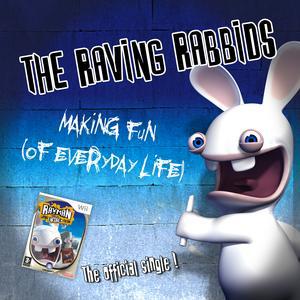
Folks, I am not a punctuation Nazi. I think I've made this abundantly clear already. However, as I noted previously, I will get a little twitchy when such mistakes create some fundamental difference in meaning. Thus, watch your parentheticals around me. Misplaced parentheses can not only change the flow of a sentence, but they can alter the information that is conveyed.
This is the cover for the new single "Making Fun (Of Everyday Life)," a novelty song released to promote the new video game "Rayman: Raving Rabbids 2." In general, parentheses are used to indicate extra or unnecessary information or inserts. In song titles, they indicate name duality. A song with parentheticals in the title usually has an official, "short" title and a "longer" title, typically due to the "short" title being part of a longer line in the chorus or other prominent place. (Pulling a random CD out of my collection--"Pure 80's"--I find "Sweet Dreams (Are Made of This)" by Eurythmics. Those who've heard the song know that "Sweet dreams are made of this" is the first line of said song's chorus, but it's perfectly acceptable just to call the song "Sweet Dreams.") Occasionally, you'll find them used to show the discrepancy between a song's "official" title (what the artist[s] called it) versus what it is commonly known as. (I've seen a lot of people write "Baba O'Reilly (Who Are You)", though I don't know if any album ever referred to that song as such.)
What we are looking at here is an example of the former, certainly (I braved listening to it just to make sure), but the parenthetical is so oddly sectioned it baffles me. The whole idea behind parentheses, in song titles or in writing, is to indicate that the material contained within is optional or dropable. It can be cut without affecting the meaning of that which comes before or after.
The problem here (similar to my "rebel against/revel against" quandary several posts ago) is that "Making Fun" means nothing by itself in English. Well, literally, it would mean the process of creating fun, which is not quite semantically nonsensical. But it is clearly meant here to be part of the compound verb "to make fun of," which has a clear and definite meaning that is quite distinct from simply "making fun." "Making fun" by itself cannot be used to mean "to tease or mock." It is a transitive compound verb, and you can't split it, either (I temporarily forget my jargon). Just try and say "When I was little, I got made fun." Sounds awkward, doesn't it? "When I was little, I got made fun of." Better. "They made fun me." "We made fun the bad movie." O where O where has my little preposition gone?
Of course, if they rescued the "of" from the innards of the Parentheses Jail and put it back where it belongs, it'd still sound pretty strange. Prepositions without modified noun phrases sound pretty weird all by their lonesome. (But again, ending sentences with prepositions is perfectly normal. You do it all the time when you ask questions. If a preposition is at the end of a sentence, it just means that its noun phrase has moved somewhere else in said sentence or is implied.)
Why is the parenthetical even necessary here? "Making Fun of Everyday Life" seems like a pretty satisfactory song title to me. It's not even that long. There are plenty of even longer song titles that make do without.
In the vein of the original Rabbids promotional videos: "Bunnies Can't Use Parentheses Properly."
[Via GoNintendo]
No comments:
Post a Comment